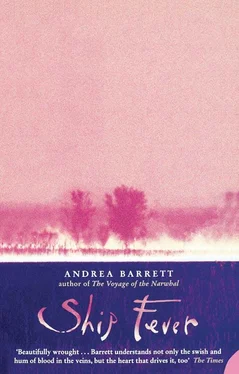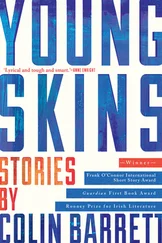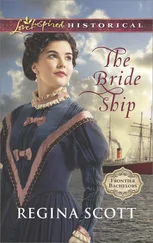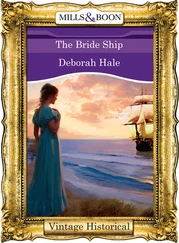A dog came bounding down the creek, flashed white before us, and then disappeared. Of course this wasn’t our father’s dog; that dog lived in another place and wouldn’t be important to us for years. But this dog, even then, made Rose think of our father. We had not had a dog when we were young, because our father had claimed to be allergic. Recently his allergies had disappeared, and from phone calls Rose had learned that he’d acquired first one dog and then another. First dogs and soon a wife. Both of us were troubled by this possibility. Bianca, although Rose didn’t know it then, had in mind a consultation with Suky, which might have told us how to feel about our father’s decision.
“Conformation and catalysis,” she said, waving a muddy arm over her head. “Specificity and inhibition, protein architecture and gel chromatography. It makes me tired. Where’s the excitement? Where’s the fun?”
“The job part isn’t so fun anymore,” Rose admitted, thinking how biochemistry had seemed like magic when she and Bianca were young. The white dog reappeared and floated over the field to them. “I can’t explain it,” Rose said to Bianca. She held out her hand to the dog but the dog ran off again. “The experimenting part, the real part — it’s still fun for me.”
Bianca said, “I’ll show you something fun,” and pushed herself up from the muddy bank.
Back into our wet clothes, back across the dark lawn, back through the narrow window and into Rose’s laboratory. Rose’s lab, not Bianca’s; Rose’s name was on the door and on all the papers and awards. Both of us knew this to be unfair; the name was only half a name.
Bianca rummaged in the pack and found some chocolates, which she and Rose shared. Then she led Rose into the lab and swiftly arranged tubing and glassware into an elaborate array. She spread a white cloth over the bench and set down a handful of mushrooms.
“Where did you get those?” Rose asked.
“Out there,” Bianca said, pointing towards the creek. “From the trees.”
Rose could not remember gathering any mushrooms, nor any time when Bianca might have slipped away and gathered them herself. She sat on the floor with her back against the spectrophotometer and watched, half in a dream, as Bianca took over the lab.
What was Bianca saying? A long stream of words, only some of which made sense. “I’m losing you,” Bianca said. And then something about how she believed she could see our futures and that they looked like this: Rose would grow drier, thinner, sharper, more famous; Rose would win prizes and buy a small house of her own, in which every room would be cool and clean. Bianca would drift from state to state: Wyoming, Idaho, Maine, Hawaii; panic, detachment, elation. Most of what she said that night would not come true, but she believed it and feared it. In one important way her fear was justified.
As Bianca spoke she minced the mushrooms very fine, ground them in a mortar and soaked them in water and then in ethanol. She squeezed and extracted, strained and heated, stirred and cooled. Then she set up a fractionating column and let the vapor from the distilling flask rise gently through the wisps of glass wool. Fluid dripped into the receiving flasks, a drop or two at a time. One fraction, quite aromatic, was as clear and bright as rubies.
Fire, water, earth, and air, she mumbled while Rose listened. Cinnabar, hartshorn, verdigris, tartar. Cinnabar, she reminded Rose, was once called dragon’s blood and was thought to be the blood of a serpent crushed to death by a dying elephant. She pipetted a sample of ruby fluid and released it on her tongue: bitter, she said. So bitter. Musky, alkaline, faintly salt. “Outlaw pharmaceuticals,” she said. “Every biochemist’s province.”
Rose closed her eyes; when she opened them again she saw bundles of herbs and retorts. The athanor, the furnace of transmutation, was shaped like a giant egg. Suky said, Would you girls like to go for a sail? and Bianca said to Rose, “Did you hear that?” It was not possible that her sister could deny it.
“Mom?” Rose said. Suddenly our mother seemed to be speaking inside her head.
Bianca nodded, relieved. When school was out and the weather was good, she and Rose had sometimes sailed Suky’s small green Comet and tried to make sense of the sheets and lines. The wind, bouncing off the hills, had come from all directions at once and made the sailing difficult.
A bubble rose slowly in one of the flasks and broke with a sigh. A few minutes later we heard our great-aunt Agnes say, Dear, could you rub my back? I have this pain in my side. Rose shifted on the floor and moved her hand along her ribs. “That was strange,” she said.
“I don’t know,” Bianca said, almost absentmindedly. “I hear Aunt Agnes all the time. I think this is almost done.”
Bianca removed her clothes for the second time that night and sat cross-legged and naked on the floor, not far from sleepy Rose. She tore a tiny strip from a piece of filter paper and held it, hardly more than a hair, to the corner of Rose’s eye. Rose tried not to blink. A bit of moisture crept up the paper and turned it dark. Bianca dropped the paper into the flask and then added a bead of her own saliva.
She was talking, still. Rose tried to concentrate on her words. In Hilo, Bianca said, she had swum the harbor in the dead of night, secretly boarding the boat where she lived alone and illegally. In Alaska she had had visions in a tent by a lake so wild she saw no one for weeks at a stretch.
“All of it’s slipping away,” she said. “Do you know what I mean?” Rose nodded, although most days Bianca’s life seemed utterly foreign to her. “All the people I meet now, they’re like radios that only get two or three stations while the news from the rest of the universe slips by. No one’s listening. I can’t stand it.”
“That’s not what I’m like,” Rose said. “That’s only part of me.”
But Bianca shook her head. Rose would see this evening as an aberration, she declared; come morning, she’d be ashamed of herself. The world was spinning in such a way that soon everything that had once seemed important would be declared an error or a dream. All Bianca wanted to do was to keep her sister in touch with a part of the world she persistently denied.
The rest of that night is mostly lost to us now, but we remember a handful of things. Sometime before dawn we either did or didn’t call our father, waking him to beg him not to sell the winery. But why would we have done this, if we did it? Rose would not have wanted to echo the phone call Bianca claimed to have made the night before, and even if she’d forgotten that, the winery was not a place we ever visited. Nonetheless, Rose believes that Bianca woke her after a brief, shared nap; that we made this call; that during it our father invited us to his wedding and we both said we were busy that day. Childish, childish. Rose is still ashamed of this, but Bianca claims that Rose dreamed the entire conversation. It’s true, though, that neither of us took part in the festivities.
The next morning, Rose woke after eight with a stiff neck and a numb foot. Bianca was nowhere to be seen. Rose, hungover and tired, believed that Bianca might be seducing a janitor in a closet or making a fool of herself in the cafeteria or driving back to Vermont by way of Labrador. She always had a tendency to believe the worst of Bianca. But Bianca’s pack was still on the floor and the office was strewn with bottles and damp shoes and half-smoked joints.
Quickly, guiltily, Rose disposed of the evidence. She flung open the window, praying that the sweet, heavy odor might dissipate before anyone dropped by. In the mud below the window she saw deep footprints, which led away from the building and into the grass and looked exactly as if two people had leapt from the lab and escaped.
Читать дальше
Конец ознакомительного отрывка
Купить книгу












